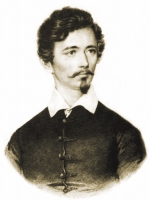| Petőfi Sándor | |
| 裴多菲·山多爾 | |
| 裴多菲·山陀爾 | |
| 彼得斐 | |
|
閱讀裴多菲 Sándor Petöfi在诗海的作品!!! | |
■在爭取民族自由的鬥爭 環境中成長並為愛情謳歌
1823年1月1日,裴多菲·山陀爾生於奧地利帝國統治下的多瑙河畔的阿伏德平原上的一個匈牙利小城,父親是一名貧苦的斯拉夫族屠戶,母親是馬紮爾族的一名農奴。按照當時的法律他的家庭處在社會最底層。
一部分祖先來自中國漢代匈奴西遷部落的匈牙利,帶有東西兩種文化的激烈碰撞的特點,在歐洲歷史上居於特殊地位。由於長期受到周邊民族的歧視壓迫,匈牙利人近千年來一直擅長用詩歌作為鼓勵本民族戰鬥的號角,近代更涌現出一大批傑出的愛國詩人。17世紀以後,匈牙利又一直受奧地利帝國的統治而喪失了獨立地位,爭取自由的起義鬥爭此起彼伏。
生活在這種環境下的裴多菲,少年時代就願意聽老年人講述民族英雄鬍斯領導起義的傳說。在小酒店和同伴談論着當年匈牙利民族爭取獨立而鬥爭的故事,在他幼小的心靈上深深打下烙印。這種“自由論壇”的氛圍,也極大地促進了裴多菲語言的發展和進步,很小的時候他就能用匈牙利語和斯洛伐剋語自由交談,拉丁語也有了一定的基礎。
1835年,12歲的窮孩子裴多菲有機會到奧賽德求學,三年時間裏他盡顯了聰明才智,完成校方規定的課業外又組織起進步的學生團體,閱讀和研究法國大革命的歷史和匈牙利古典作傢的作品。1838年,裴多菲寫下了他的處女作諷刺詩《告別》。該詩繼承發揚了匈牙利古典詩歌的傳統,初步體現了他畢生所一直遵循的詩歌語言大衆化的特點。他又當過兵,做過流浪演員,任過《佩斯時裝報》的助理編輯,豐富的社會經歷更深化了他創作的源泉。
1846年9月,23歲的裴多菲在舞會上結識了伊爾諾茨伯爵的女兒森德萊·尤麗婭。這位身材修長、有淺藍色眼睛的美麗姑娘的清純和率真,使年輕詩人一見傾心,擁有大量土地莊園的伯爵卻不肯把女兒嫁給裴多菲這樣的窮詩人。面對阻力,裴多菲對尤麗婭的情感仍不可抑製,在半年時間裏發出了一首首情詩,如《緻尤麗婭》、《我是一個懷有愛情的人》、《你愛的是春天》、《凄涼的秋風在樹林中低語》、《一下子給我二十個吻吧》等。這些抒情詩中的珍品,鼓動尤麗婭衝破父親和家庭的桎梏,在一年後同裴多菲走進了婚禮的殿堂。
此刻,歐洲大地已涌起革命洪流,匈牙利人民起義也如涌動的岩漿。蜜月中的裴多菲歡樂與憂鬱交織。他不願庸碌地沉溺於私傢生活,寫下了著名箴言詩《自由與愛情》:“生命誠可貴,愛情價更高……”這首名作,此後百年間一直是激勵世界進步青年的動人詩句。
■以詩歌做號角 用滿腔激情爭取民族獨立
1848年春,奧地利統治下的匈牙利民族矛盾與階級矛盾已經達到白熱化程度。裴多菲目睹人民遭受侵略和奴役,大聲地疾呼:“難道我們要世代相傳做奴隸嗎?難道我們永遠沒有自由和平等嗎?”詩人開始把理想同革命緊緊地連在了一起,决心依靠貧苦人民來戰鬥,並寫下一係列語言凝練的小詩,作為鼓舞人們走嚮民族民主革命的號角。
3月14日,他與其他起義的領導者在佩斯的一傢咖啡館裏議定起義事項,並通過了旨在實行資産階級改革的政治綱領《十二條》,當晚,裴多菲便寫下起義檄文《民族之歌》:
起來,匈牙利人,祖國正在召喚!
是時候了,現在幹,還不算太晚!
願意做自由人呢,還是做奴隸?
你們自己選擇吧,就是這個問題!
15日清晨,震驚世界的“佩斯三月起義”開始了,1萬多名起義者集中在民族博物館前,裴多菲當衆朗誦了他的《民族之歌》。起義者呼聲雷動,迅速占領了布達佩斯,並使之成為當時的歐洲革命中心。翌年4月,匈牙利國會還通過獨立宣言,建立共和國。恩格斯曾指出:“匈牙利是從三月革命時起在法律上和實際上都完全廢除了農民封建義務的唯一國傢。”
面對布達佩斯起義,决心維護歐洲舊有秩序的奧地利皇帝斐迪南馬上聯合俄國沙皇尼古拉一世,34萬俄奧聯軍嚮着人口僅有500萬的匈牙利兇狠地壓來。民族危難時刻,裴多菲給最善戰的將軍貝姆去了一封信:“請讓我與您一起去戰場,當然,我仍將竭力用我的筆為祖國服務……”在1848這一戰火紛飛的年份裏,裴多菲寫下了多達106首抒情詩。翌年1月,裴多菲成為一名少校軍官,他寫詩同時又直接拿起武器參加反抗俄奧聯軍的戰鬥。
■犧牲於哥薩剋騎兵矛下 短暫的一生留下800多首詩歌
1849年夏,匈牙利革命軍在強敵壓迫下戰至最後時刻。7月31日晨,貝姆將軍將還能戰鬥的300人組成了一支騎兵隊,在戰鬥打響前又特意叮囑裴多菲留下。詩人卻違背了將軍的命令,跟在騎兵隊後面出發。這些英勇的匈牙利戰士與數倍的敵人膠着在一起時,很快便被淹沒和融化了。身材削瘦的詩人也被兩名俄國哥薩剋騎兵前後圍住,一柄彎刀兇狠地嚮他劈來,詩人閃身躲開,但同時另一把尖利的長矛已刺進了他的胸膛,詩人痛苦地倒下了……
此後的數十年裏,匈牙利人民始終不願相信他們的詩人已不在人世,傳說不斷出現。有人說曾在一個農民傢裏看見過他,有人稱自己被俘後在俄國見過裴多菲。匈牙利議會還專門進行了調查,但令人失望的是,這個“目睹者”既沒當過兵,更未被俘虜過……
經過匈牙利人民的反抗鬥爭,奧地利帝國被迫在1867年同匈牙利簽訂協定,承認在奧國皇帝為統一元首的前提下,可以建立二元化的聯合國傢政體,國名也改稱奧匈帝國。一次世界大戰結束時奧匈帝國崩潰,1918年末匈牙利實現了完全獨立建國。
裴多菲犧牲時僅26歲,身後留下22歲的妻子和1歲半的幼子。他一生中寫下了800多首抒情詩和8部長篇敘事詩,此外還有80多萬字的小說、政論、戲劇和遊記,且有相當部分在戰火中完成。這樣的高産率,在歐洲文學史上是非常罕見的。
在匈牙利文學乃至其整個民族的發展史上,裴多菲都占有獨特的地位。他奠定了匈牙利民族文學的基石,繼承和發展了啓蒙運動文學的戰鬥傳統,被人譽為“是在被奴隸的鮮血浸透了的、肥沃的黑土裏生長出來的‘一朵帶刺的玫瑰’”。一個多世紀以來,裴多菲作為爭取民族解放和文學革命的一面旗幟,也得到了全世界進步人士的公認。他那一首首膾炙人口的詩篇,至今仍在廣為傳誦。
Early life
His birth certificate, written in Latin, gives his name as Alexander Petrovics. His father's first language was Hungarian. (According to many sources, he was of Serb descent and his original name was Stevan Petrović, while according to other sources, he was of Slovak descent ), and his mother was Mária Hrúzová (Hungarian: Hrúz Mária) who spoke only Slovak. However, he had a very strong self-awareness of being Hungarian, becoming the spiritual leader of the revolutionary radicals (who wanted full independence from the Habsburg Monarchy and a free Hungary). He wrote some of Hungary's greatest national poetry - from his poem, Nemzeti dal ("National Song"):
By the God of the Hungarians / We swear, / We swear, that we will be slaves / No longer! - (literal translation).
Petőfi's entry in the parish register (kept at the Kiskőrös Petőfi Museum)The family lived for a while in Szabadszállás, where his father owned a slaughterhouse. Within two years, the family moved to Kiskunfélegyháza, and Petőfi always viewed the city as his true birthplace. His father tried to give his son the best possible education, but when Sándor was 15 they lost their money due to the Danube floods of 1838 and the bankruptcy of a relative. Sándor had to leave the lyceum he attended in Selmecbánya (Banská Štiavnica). He had small jobs in various theatres in Pest, worked as a teacher in Ostffyasszonyfa and was a soldier in Sopron.
After a restless period of travelling Petőfi attended college at Pápa, where he met Mór Jókai, and a year later, in 1842, his poem A borozó ("The Pub") was first published in Athenaeum under the name Sándor Petrovics. On November 3 of the same year he published this poem, using the name "Petőfi" for the first time.
However, Petőfi was more interested in the theatre. In 1842 he joined a travelling theatre, but then had to leave it. He tried to keep himself financially afloat by writing for a newspaper, but that wasn't enough. Malnourished and sick, he arrived in Debrecen, where his friends helped him get back on his feet.
In 1844 he walked from Debrecen to Pest to find a publisher for his poems, in which he succeeded, and the poems were becoming increasingly popular. He relied on folkloric elements and popular, traditional song-like verses.
Among his longer works is the epic János Vitéz (1845, "Sir John", ISBN 1843910845). On the other hand, he felt he was forced into a folkish, wine-and-pubs, low-quality niche by his publisher, while in fact he also had an extensive Western-oriented education and revolutionary passions to write about. (Of course, these would be difficult to publish, due to the heavy censorship of the time).
In 1846, he met Júlia Szendrey in Transylvania, and they married the next year, against the will of her father, spending their honeymoon in the castle of Count Sándor Teleki, the only aristocrat among Petőfi's friends. Afterwards, he was even more possessed by thoughts of a global revolution. He moved to Pest and joined a group of like-minded students and intellectuals who regularly met at Café Pilvax. They worked at promoting Hungarian as a language of literature and theatre. (The first permanent theatre (the National Theatre) performing in Hungarian opened at this time.)
Sándor Petőfi in 1844
The Hungarian Revolution of 1848
March 15, 1848 was Petőfi's day. Among the various leaders of the revolution - called Márciusi Ifjak ("Youths of March") - Petőfi was the key in starting the revolution in Pest, co-author and, respectively, author of the two most important written documents: the 12 Pont (demands to the Habsburg Governor-General) and the Nemzeti Dal.
When the news of the revolution in Vienna reached them on the 15th, Petőfi and his friends decided to change the date of the "National Assembly" (a rally where a petition to the Hungarian noblemen's assembly would be approved by the people), from March 19th to the 15th. (This was a lucky decision, given that the authorities knew their plans, and intended to arrest the revolutionaries on the 18th.)
On the morning of the 15th, the revolutionaries wit Petőfi began to march around the city of Pest, reading the poem and the 12 points to the crowd (which swelled to thousands). Then, they visited printing presses, declaring an end to all forms of censorship and printing Petőfi's poem together with the 12 Pont. The mayor was forced by the crowds to sign the 12 Pont. Later, a mass demonstration was held in front of the newly-built National Museum, after which the group left for Buda on the other bank of the Danube. When the crowd rallied in front of the Imperial governing council, the representatives of Emperor Ferdinand felt they have no choice but to sign the 12 points. As one of the points was freedom for political prisoners, the crowd moved on to greet the newly freed revolutionary poet Mihály Táncsics.
Petőfi's popularity waned as the memory of the glorious day faded, and the revolution went the way of high politics: to the leadership of the nobles. Those in the noblemen's Assembly in Pozsony/Bratislava) had in fact been pushing for slower reforms at the same time - delivering a list of demands to the Emperor on the 13th - but events had overtaken them briefly. Petőfi disagreed with the Assembly, and criticised the way they saw the goals and methods of the Revolution. (His colleague Táncsics was imprisoned yet again by the new government.) In the general election, he ran in his native area, but did not get the seat. At this time, he wrote his most serious poem, the epic Az Apostol ("The Apostle", an epic about a fictional revolutionary who, after much suffering, attempts, but fails to assassinate a fictitious king.)
Petőfi joined Polish revolutionary general Józef Bem's Transylvanian army, fighting a successful campaign against Habsburg troops, Romanian and Transylvanian Saxon militias. However, it was defeated repeatedly when Imperial Russia intervened to aid the Austrians. He was last seen in the battle of Segesvár (Sighişoara), July 31, 1849. The circumstances of his death are mysterious.
The main opinion is that he died in the battle, based on the account of a Russian military doctor in his diary. He saw an unusual-looking corpse dead of a stomach lance wound, having Petőfi's characteristic yellowish face and matching clothing; Petőfi had the habit of wearing a civilian jacket with uniform trousers. Recently an ethnic Hungarian Romanian claimed to have located fragments of a stone eagle which local Hungarians are known to have erected in 1855 on the site of the mass grave where Petőfi was allegedly buried. Considering the number of fallen Hungarians in the battle of Segesvár, an excavation would not offer much hope, even if genetic material could be obtained from the graves of his parents. Some Hungarians, notably Ferenc Morvai, believe Petőfi was captured and taken to Russia, where he died some years later of natural causes.
After the Revolution was crushed, Petőfi's writing became immensely popular, while his rebelliousness served as a role model ever since for Hungarian revolutionaries and would-be revolutionaries of every political colour. Today, streets are named after him throughout Hungary (perhaps one in every village, but in Budapest there are 11) and in the Hungarian-inhabited areas of Transylvania, as well as a national radio station and a bridge in Budapest.
Poetry
Petőfi started his career as a poet with so-called "popular situation songs", to which his first published poem, A borozó ("The Winery", 1842), belongs. It is the song of a drinker praising the healing power of wine to drive away all troubles. This kind of pseudo-folk song was not unusual in Hungarian poetry of the 1840s, but Petőfi soon developed an original and fresh voice which made him stand out. He wrote many folk song-like poems on the subjects of wine, love, romantic robbers etc. Many of these early poems have become classics, for example the love poem A virágnak megtiltani nem lehet ("You Cannot Forbid the Flower", 1843), or Befordultam a konyhára ("I Turned into the Kitchen", 1843) which uses the ancient metaphor of love and fire in a playful and somewhat provocative way.
The influence of folk poetry and 19th-century populism is very significant in Petőfi's work, but other influences are also present: Petőfi drew on sources such as topoi of contemporary almanac-poetry in an inventive way, and was familiar with the works of major literary figures of his day, including Percy Bysshe Shelley, Pierre-Jean de Béranger and Heinrich Heine.
Petőfi's early poetry was often interpreted as some kind of role-playing, due to the broad range of situations and voices he created and used. Recent interpretations however call attention to the fact that in some sense all lyrical poetry can be understood as role-playing, which makes the category of "role-poems" (coined especially for Petőfi) superfluous. While using a variety of voices, Petőfi created a well-formed persona for himself: a jaunty, stubborn loner who loves wine, hates all kinds of limits and boundaries and is passionate in all he feels. In poems such as Jövendölés ("Prophecy", 1843) he imagines himself as someone who will die young after doing great things. This motif recurs in the revolutionary poetry of his later years.
The influence of contemporary almanac-poetry can be best seen in the poem cycle Cipruslombok Etelke sírjára ("Branches of Cypress for Etelke's Tomb", 1845). These sentimental poems, which are about death, grief, love, memory and loneliness were written after a love interest of Petőfi's, Etelke Csapó, died.
In the years 1844-45 Petőfi's poetry became more and more subtle and mature. New subjects appeared, such as landscape. His most influential landscape poem is Az Alföld ("The Plains"), in which he says that his homeland, the Hungarian plains are more beautiful and much dearer than the Carpathian mountains; it was to become the foundation of a long-lived fashion: that of the plains as the typical Hungarian landscape.
Petőfi's poetic skills solidified and broadened. He became a master of using different kinds of voices, for example his poem A régi, jó Gvadányi ("The Good Old Gvadányi") imitates the style of József Gvadányi, a Hungarian poet who lived at the end of the 18th century.
It's interesting to note that several of Petőfi's poems were set to music by the young Friedrich Nietzsche, who composed as a hobby while studying classics at Pforta before beginning his career in philosophy.
Monuments
Petőfi has a larger than life terra cotta statue near the Buda end of Erzsébet Bridge, sculpted by Miklós Izsó and Adolf Huszár.
References
^ B92 - Vesti - Na današnji dan, 31. jul - Internet, Radio i TV stanica; najnovije vesti iz Srbije
^ Sándor Petõfi
^ languagehat.com: Comment on THE FIRST LITHUANIAN BOOK
^ Élet és Irodalom
^ Igaz-e, hogy Petőfi édesapja szerb volt? - NATIONAL GEOGRAPHIC MAGYARORSZÁG
^ Magyar Életrajzi Lexikon 1000-1990




